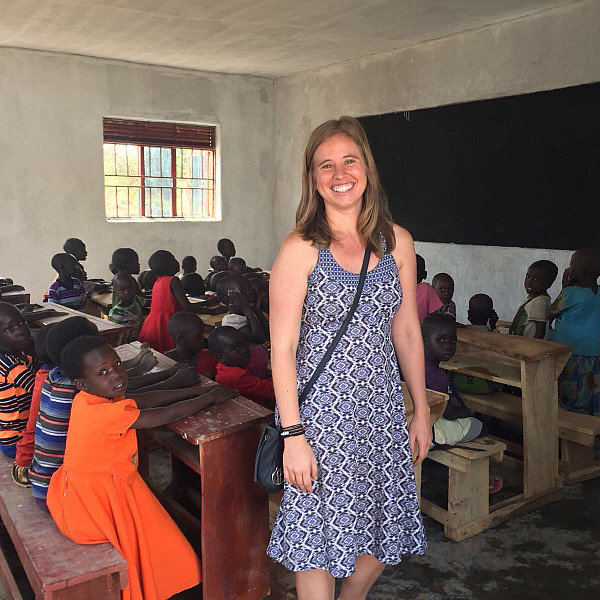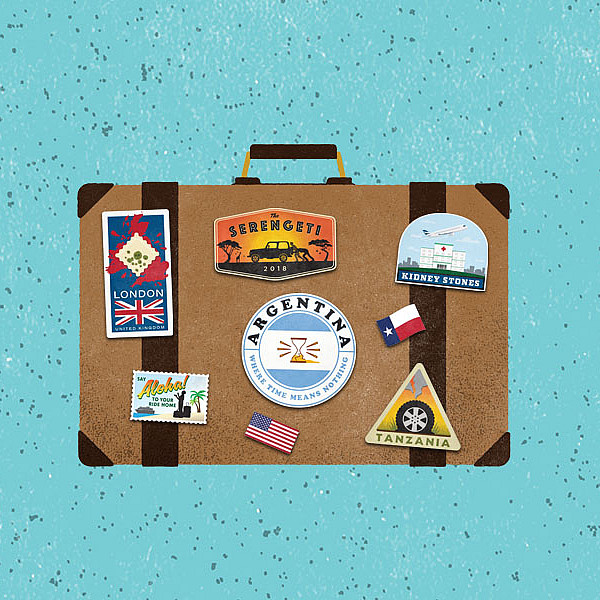News
Finding Common Ground
October 23, 2019
October 23, 2019
Open gallery

With individuals and industries connecting more fluidly across national borders in the digital age, higher education in the past two decades has prioritized its responsibility to promote students’ sense of global citizenship. Competing definitions of this concept abound, but the World Economic Forum (2017) suggests, “There’s a general consensus that the term orients towards recognizing the interconnectedness of life, respecting cultural diversity and human rights, advocating global social justice, empathizing with suffering people around the world, seeing the world as others see it, and feeling a sense of moral responsibility for planet Earth.”
Laurie Gallun Fitzgerald ’97 succinctly defines a global citizen as “a person who is aware of the larger world and appreciates the incredible diversity that other places and cultures have to offer.” She would know: As a Southwestern alumna, Fitzgerald has been a beneficiary of the University’s commitment to preparing students for global citizenship, which it fosters through domestic and international programs such as community-engaged learning, study away, and study abroad. And although becoming a long-term expat is not a required qualification for global citizenship, Fitzgerald and many other alumni have gone on to find “their countries” all over the world after leaving SU, whether sparked by a sense of adventure and the desire to inhabit the unfamiliar or propelled by external circumstances to live and work beyond their homelands.
Diaspora. Expatriate. Emigrant. External Citizen. All of these terms are used, often interchangeably, to refer to individuals living outside of their country of birth or nationality. - The Migration Policy Institute
Springboards to Global Citizenship
For many alumni expats, Southwestern provided various springboards to becoming a global citizen—jumping-off points discovered not in a foreign country but, rather, directly on campus and within U.S. borders.
Fitzgerald’s international impetus was academically unusual for a chemistry major: literature. “During my first semester at Southwestern, my entire freshman class read Cities on a Hill by Frances FitzGerald,” she recalls. “[It’s] about four radically different communities within America. That book and the discussions that followed sparked my curiosity in other cultures and lifestyles. That curiosity has never left me.”
A seventh-generation Texan, Mark Mayfield ’76 majored in history and Spanish. “I was always interested in international affairs, other cultures, and different languages,” he explains. Mayfield’s theater minor provided another platform on which he could “stand in others’ shoes and understand different ways people look at the world.”
History, Spanish, theater—perhaps Mayfield was always on fire to explore the world. But his studies fanned the flame. “Dr. Bill Jones’s World Civilizations course gave me a sense of the sweep of world history and how different cultures are interrelated,” he says. “Studying Spanish … and [taking] classes one summer in Mexico gave a look at other ways of seeing the world.” Beyond that classroom experience, Mayfield’s university years enhanced his innate curiosity: “Southwestern taught me to tie things together. Every place I go, I want to learn the history, read some of the literature, and hear some of the legends and folktales. You can’t just read the current newspapers and some economic statistics and understand a country—I try to look beyond the surface.”
Fanny Tang Cederberg ’06 found that campus social opportunities encouraged her interaction with people of various interests and dialogues. “The more I put myself out there,” she says, “the more I am able to relate to a diverse group of people and navigate new experiences.” From learning to rock climb to attending Passover Seder and seeing her first Bollywood film at an International Studies Abroad event, Cederberg’s borders expanded further through Southwestern’s Washington, DC–based study-away program: “I can’t imagine a city in the U.S. with more networking opportunities and cultural activities for looking to establish a life abroad.”
Impacts of Taking the International Path
That ability to understand diverse worldviews, a staple of global citizenship, has served Mayfield well throughout his career. After graduating from Southwestern, Mayfield married fellow alum Kay Webb ’78, attended the University
of Texas School of Law, and practiced law for five years. In 1986, the couple gravitated to the U.S. Department of State, where both became officers in the Foreign Service.
Mayfield describes his specialty as “consular work, which concentrates on assisting U.S. citizens overseas and adjudicating nonimmigrant and immigrant visa applications from foreign cities.” He served for 30 years; he and Kay retired, though Mayfield continues to do part-time work for the Office of Inspector General from their home in Temple. “It’s important to understand that the world doesn’t stop at our national borders,” Mayfield reflects. “What we do affects other countries and vice versa.”
Fitzgerald’s experiences demonstrate that becoming a citizen of the world can help shape not just one’s career but also one’s personal life.
Fitzgerald’s experiences demonstrate that becoming a citizen of the world can help shape not just one’s career but also one’s personal life. Like Mayfield, she earned a degree from the University of Texas School of Law, and over the years, her cases often involved large telecommunication companies with global disputes, so Fitzgerald traveled extensively throughout Europe and Asia. In 2018, she pivoted, leaving law for business, and she is now vice president of licensing for Teletry, LLC, in Dublin, Ireland, where she negotiates patent license agreements with telecom companies across the world.
An avid lover of the outdoors, Fitzgerald has climbed and hiked all over the globe: Mount Kilimanjaro, Patagonia’s Torres del Paine, the Milford Track in New Zealand. She’s biked in Buenos Aires, boated through Stockholm, and wandered Beijing and Bangkok. “I think getting out and seeing the world is the best education there is,” she says. “It can also lead you to the love of your life: A trip to India led me to my husband.”
Of course, developing one’s awareness of, responsibility for, and participation in the world community isn’t without its hardships. It often comes with its own set of stumbling blocks and discomforts. But those very same challenges lead to intellectual and personal growth.
Though she’d always wanted to work and live abroad, Cederberg didn’t really have a plan as to how that would unfold. Once she’d graduated with a degree in political science, she moved to Washington, DC, where she paid off student debt while working various jobs. Nine years ago, her husband joined the State Department as a Foreign Service officer. They moved to China and Mexico and are currently living in Qatar, where Cederberg is employed as the outreach coordinator in the consular section of the U.S. Embassy and is on register to join the Foreign Service herself. “Life abroad is an adventure that demands you to step out of your comfort zone and experience new things,” she shares.
Finding Your Feet as a Global Citizen
Helpful suggestions for preparing to live and work abroad.
Learn other languages, and practice in a variety of contexts.
“Achieving a high level of proficiency in a foreign language requires an immense deal of dedicated practice,” which native speakers appreciate, says Cederberg. Understanding cultural norms surrounding language is just as important, she adds. Fitzgerald agrees: “IfI could do it all again, I would invest the time and energy to learn Spanish and Mandarin.”
Take advantage of job resources.
Southwestern’s Center for Career & Professional Development and PirateConnect provide beneficial career preparation and connections for students and alumni. Cederberg remembers “cringing as I watched a recording of myself during a practice job interview session, but it resulted in useful feedback.”
Embrace “the last three feet of diplomacy,” or person-to-person interaction.
“Be willing to talk to people and, more importantly, to listen,” suggests Mayfield. “There’s always more to learn … and barbers and cab drivers may be able to tell you more about a place than government officials and university professors.”
Nurture lifelong curiosity.
Whether studying new languages, finding friendships in other countries, or taking on new employment in a foreign land, maintaining wonder at the world and a willingness to connect and learn is crucial to success. “Getting to learn about new places and adapting to new cultures are wonderful opportunities, and you have to always stay in learning mode. It’s tough to learn a new skill set with a new cast of characters every few years, but it’s gratifying to master the challenge,” says Mayfield.
“People are People”
When working and residing abroad, citizen may warrant more emphasis than global. Mayfield, Cederberg, and Fitzgerald all appreciate how developing personal connections and finding international community—even amid divergent ways of living, thinking, and seeing the world—enriched their journeys.
“Travel is almost guaranteed to change you,” Mayfield explains. “I love this Mark Twain quote: ‘Travel is fatal to prejudice, bigotry, and narrow-mindedness, and many of our people need it sorely on these accounts. Broad, wholesome, charitable views of men and things cannot be acquired by vegetating in one little corner of the Earth all one’s lifetime.’”
As he readies to travel this spring to Vietnam and Laos for an assignment, Mayfield’s preparing to meet yet another culture. In the past, he’s found practicing his faith helps harmonize differing worldviews. He says, “I treasure the sense of unity in worship services around the world. Shared worship can connect you with others, whether it is in a Catholic service in Juba, South Sudan, where the ladies in the choir break into ululation; the services at the U.S. Embassy in Baghdad, with a British Anglican priest, GIs praying with pistols on their hips, and contractors from East Africa singing hymns in Swahili; or in a crowded Church of Christ in Bangkok.”
Countries Lived or Worked in by Fitzgerald, Cederberg, and Mayfield: Qatar, China, Mexico, Ghana, Senegal, The Gambia, Brazil, Angola, Austria, Thailand,
Singapore, South Sudan, Taiwan, Guatemala, Iraq, Venezuela, Honduras, Nigeria, Argentina, Turkey, Ireland
Living in Qatar, Cederberg discovers new perspectives in daily activities, including volunteering (she’s helped at and raised funds for an animal shelter, an orphanage, and a center for students with disabilities) and work. The embassy section where she’s employed includes colleagues from eight different nations, and she’s learned from everyday interactions.
“I listened to a Yemeni friend describe how the war in his country affected his family and his opinion on how to resolve the conflict,” she says. “My Sudanese colleagues taught me how to debone and polish off an entire fried fish with one hand. My Egyptian friend and I compare fashion trends in our countries.” Cederberg concludes, “While I am always thankful to be able to travel and check off many places on my bucket list during my time abroad, my most cherished memories involve the conversations with the people I’ve met along the way.”
Reflecting on her family’s move to the Republic of Ireland, Fitzgerald says, “It’s one thing to visit Paris or Asia as a tourist. It’s an entirely different thing to spend a week in Paris with a French colleague who has lived her entire life there. Or to share a meal with a Hong Kong–based colleague who knows all there is to know about dim sum.” With those colleagues, in faraway ventures, she’s discovered great places of commonalities: “I’ve grown to appreciate that people are people all over the world. We all have the same basic concerns and joys and needs and wants. People are more alike than different.”
















